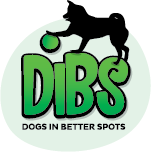Sometimes applicants are afraid to ask the 101 stuff so we will try to address questions here!
Q. Does DIBS have any rules about crate training for dogs? Some places say it’s good to do for puppies, other places say absolutely not for any of their dogs, so I just wanted to clarify that.
A: With DIBS, we do like the use of a crate to help with initial boundaries in the home. A new dog may have never lived in a home before, so our foster families will use a crate for several different reasons:
- to restrict movement to too many parts of the home
- to assist with housetraining
- to give the dog a place of their own
- to give existing pets free roam as everyone adjusts
We hope that a crate is used during the transition period only until adopters are sure that the dog is housetrained, not destructive, that they have a safe place of their own and that all is harmonious with other pets. We encourage adopters to borrow a wire crate, rather than purchase, as we like the crate to be put away once the dog has earned their spot in the home.
Q: Any recommendations for pet insurance? I’m currently looking at a few, but wondering if you had any other recommendations for insurance companies that you had good experiences with.
A: DIBS has an adopter’s group and the topic has been brought up a few times. Once you have adopted and are in the group, you can search “insurance” and can find some details. As with most rescue organizations, a new adopter can activate 30 days of free insurance (details provided at the time of approval).
Q: I was wondering if there are some specific treats or toys that are actually not good for dogs that I should steer clear of. For example, I heard that bully sticks and antlers can be very harmful.
A: We do recommend that newly adopted dogs not have any treats for the first week or so, as their stomach settles. We encourage adopters to use kibble as treats instead. Once poop is on track and there are no issues, you can explore treats!
- There are lots of great recipes for homemade treats (be sure peanut butter is xylitol-free).
- If shopping in a store, read the labels on everything you buy.
- Don’t shop at dollar stores, and ensure you are getting quality products.
- If your dog has fragile or missing teeth, take that into consideration with harder toys.
- Many adopters like bully sticks or antlers (toss them if they get brittle), and the current rage is Himalayan salt chews.
- A recent payback partner is BulkBullys and you can select DIBS (or other rescues) to benefit from your purchase.
That’s a long answer! The short answer is quality!!!
Q: For dog training lessons, are classes provided by PetSmart sufficient, or do you have a list of recommended dog trainers?
A: For some dogs, PetSmart training is fine. In a group environment work on sit, stay, etc. However, if your dog has leash reactivity or separation anxiety, or you want to work on recall, you will benefit from a more advanced class.
Q. How often should I be replacing toys?
A. It depends on the toy. You can wash or sew stuffies you can wash for a while until it’s time to toss them. Any harder toys that seem to be breaking apart could be an issue, so toss them out. If it looks like it could be ingested or a choking hazard, throw it out.
Q. What kind of enrichment activities can I do?
A. Great question and we love that you are thinking of this! There are so many options that you can do.
- Snuffle mat and hide kibble or treats in it. You can make a mat or buy one.
- Learning tricks
- Obstacle courses using pillows, boxes, etc
- Standing on a rock, or jumping over logs – are both confidence builders and fun for your dog
- Sign up for a rally class with your pup
- More ideas
Q. General tips for a beginner dog owner
A. Boundaries!!! Start off with solid boundaries and then you can navigate and adjust from there. If you start with no boundaries, it’s hard to enforce them later. A new dog will understand boundaries and will adjust quickly as they know what is expected of them. Imagine if your boss gave you an assignment with no details. You’d hot mess your way through it without a lot of confidence. Now imagine if your boss gave you an assignment and told you specifically what they wanted, the timeframe, the reward, the materials you had access to. You’d have a lot more confidence in yourself and you’d provide a better result. It’s the same with dogs!
Q. Are the dogs available for adoption given a clean bill of health, or can some have remaining medicine or vet checkups that will need to be taken over by the adopter?
A. Our dogs are fully vetted. From time to time, there is medicine that they are finishing up, which may go with the dog at the time of adoption. The first vet checkup is required immediately after adoption, and we provide the history for the adopters to provide to their vets.
More:
First Time Dog Owner Tips
